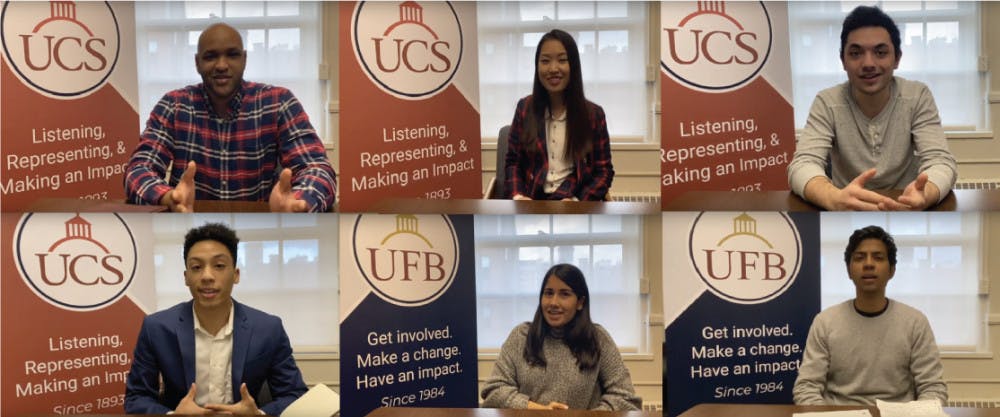Candidates for the top positions on the Undergraduate Council of Students and Undergraduate Finance Board discussed topics such as transparency, accessibility and concerns surrounding the COVID-19 coronavirus pandemic in pre-recorded videos released Monday morning.
The videos were recorded in place of the candidates’ debate, which was originally scheduled to occur on campus March 13. The debate was shifted to this online format following the University’s cancellation of in-person classes and evacuation of campus in response to the COVID-19 pandemic.
UCS Vice President Jason Carroll ’21 and Chair of Campus Life Zanagee Artis ’22 are competing for the UCS presidency, while Appointments Chair Sam Caplan ’22 and UCS Treasurer Summer Dai ’22 contend for the vice presidency, The Herald previously reported.
UFB At-Large Representative Akilesh Raman ’22 is running unopposed for UFB chair and At-Large Representative Anika Ahluwalia ’23 is running unopposed for UFB vice chair.
“Students say all the time that they want more transparency, more resources and more overall clarity about the school,” Carroll said in a video featuring the candidates for UCS president. He expressed his desire to continue his work from past UCS projects that combated food insecurity on campus and improved access to clean drinking water in residence halls.
Artis highlighted the importance of UCS in advocating for student needs. “I believe that UCS can be a more powerful driver of change in students’ lives and in campus culture,” he said. “Student activism is something that I believe is really sewn into the culture of Brown.” He added that he believes UCS should play a greater role in helping students gain accommodations in and out of the classroom.
In a separate video featuring the contenders for UCS vice president, Caplan stated that UCS should prioritize accessibility, accountability and sustainability. “Brown is an awesome community of changemakers and people who have a lot of great ideas, and oftentimes people just need access to resources to make those ideas happen,” he said. Noting his experience as appointments chair, he said that he “really worked on elevating student voices and making sure they were listened to by the administration.”
Dai said that she is “hoping to reach out to student leaders to be more proactive when it comes to addressing student concerns and connecting students with the administration,” emphasizing a need for more students to serve on University committees to increase the accountability of University administrators.
All candidates for UCS positions discussed the need to establish a Disability Justice Cultural Center, with Caplan stating that it was his number one priority. “We should foster a community where different identities and voices are welcomed and heard,” Dai added.
Candidates were also asked what actions they believed were necessary in the wake of the COVID-19 pandemic and its effect on University operations. Each candidate said that providing University financial and emotional support for students is paramount.
Raman and Ahluwalia, each running unopposed for UFB chair and vice chair respectively, responded to questions in a separate video.
Raman emphasized transparency and equity as his priorities for UFB. When asked about the greatest challenge that he believes the Board currently faces, he discussed the importance of transparent communication and student body awareness. “Oftentimes a lot of the Brown community isn’t really aware of what UFB does, and I think most of that falls on us as a board to be more active in making sure students are aware of what we do and how they can reach out to us,” he said.
Ahluwalia also highlighted funding equity as a priority. “A lot of groups feel as though they aren’t getting adequate funds to fulfill their mission, whereas some groups are getting exorbitant amounts of funds,” she said, adding that “raising awareness of how to access funding to fulfill groups’ missions and what exactly is in our policies would be a top priority.”
Both candidates expressed a desire to continue conversations on campus surrounding funding for service groups and increased transparency about how highly-funded groups use UFB funds. “Hearing from the student body and student groups is really important in getting an equitable distribution,” Ahluwalia said, noting that she would like to open up these conversations to the larger student body.
Raman and Ahluwalia both cited their experience working on UFB this past year as important to their candidacies. Raman specifically mentioned his tenure serving on the Board as an at-large member since his freshman fall, and Ahluwalia talked about her experience working on both sides of the UFB funding process as a member of student organization Smart Women Securities.
The campaign schedule was modified to account for the two-week break instituted by the University in preparation for remote learning. “We paused campaigning for a period to essentially allow for people to move out and all the chaos that happened,” said Elections Board Co-Chair Alex Song ’20.
Elections Board Co-Chair Mary Stack ’21 also highlighted UCS’ desire to increase student engagement in the election in the face of current circumstances. “We encourage students to reach out to the candidates if they have questions,” she said.
The student groups endorsements period has been extended from three days to one week, giving groups until March 30 to endorse candidates. The voting period for all UCS and UFB positions was also lengthened from four days to one week. Undergraduate students can vote through an online form beginning at 8 p.m. March 30 until 8 p.m. April 6.

ADVERTISEMENT




